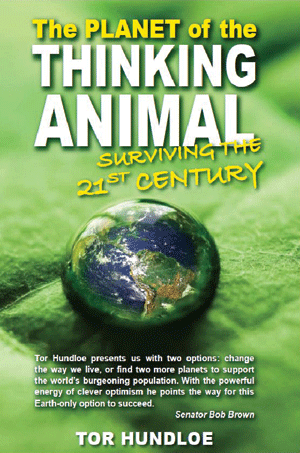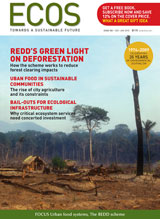
|
Published:
The smarts on evolving society
As the global population races towards the nine billion mark by 2050, The Planet of the Thinking Animal: Surviving the 21st Century offers more insight into the problems that face global society and possible ways to negotiate a sustainable existence despite them.

|
|
The Planet of the Thinking Animal Surviving the 21st Century Tor Hundloe JoJo Publishing 2009, Paperback ISBN: 9780980619300 – AU$34.99 www.jojopublishing.com |
Author Tor Hundloe is Emeritus Professor of Environmental Management at the University of Queensland and an early pioneer of the environmental movement. Through seven case studies of countries (or groups of countries) with sustainability problems and advanced solutions, he illustrates aspects of politics, economics or culture that either frustrate or facilitate progress towards sustainable development.
Setting the scene, the first four chapters look at issues such as the ownership and sustainable use of water; overfishing, aquaculture and sustainable fishing; oil and its alternatives; and the role of ecotourism in sustainable development.
The first case study focuses on Fiji and how this small island nation’s future is tied to its past. Hundloe illustrates how in some countries, progress on economic and environmental sustainability relies on overall social sustainability – resolving Fiji’s ethnic conflict will be a key factor in its development.
Next, the author looks at the future of the United Arab Emirates, an ‘oil-rich but skill-poor’ country. He addresses what may happen when the oil runs out.
The third chapter considers Russia and other countries in transition and what we can learn by scrutinising countries that have been ‘shocked’ into radical change. The author moves on to Asia – particularly China, Indonesia and Thailand – and reviews how little is being done to stem the environmental degradation resulting from rapid capitalist development.
Chapter nine turns to the positive future-facing Scandinavian countries, particularly Norway. Hundloe considers the social, political and economic values and attitudes that see these countries outperforming the rest of the world as environmentally conscious and sustainable societies.
Finally, Hundloe addresses the Australian environmental story and draws the conclusion that Australia is ‘very much a work in progress’.
Each chapter has footnotes and references for further reading. The book is peppered with break-out boxes of interesting facts or anecdotes, and tables and graphs of useful statistics. Overall, the book presents an eclectic range of information on a now familiar theme in an easy-to-read style, effectively marrying the past and the present.



